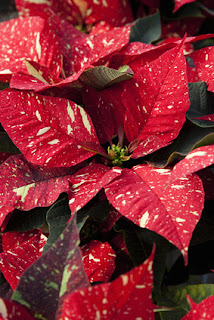The poinsettia is considered the Christmas Holiday plant and is generally purchased in full bloom at this time of the year.
What is the best care for the poinsettia plant so it
will survive the Holiday Season?
How long can I expect the plant to last?
Can
it ever be planted in the garden or is it just a seasonal plant for the
Holidays?
Initial Care of your newly purchased Plant....
- Place it near a sunny window.
- Maintain a temperature above 65 degrees F.
- Mist the plant daily with lukewarm water.
- To avoid spots on the leaves from misting use distilled water.
- Water the plant when the surface is dry to the touch.
- Water thoroughly until the water completely drains into the saucer.
- Make sure to empty the saucer of drained water.
- Keep the plant away from all drafty areas, hot or cold air.
Poinsettia Care after the Holidays....
January to March – Keep watering when the surface is dry and misting the plant
several times a day if humidity in your home is low. Poinsettias love the humidity the misting
creates.
April – Gradually decrease
watering allowing the poinsettia plant to get dry between watering. But be
careful that the plant does not shrivel. Discontinue misting during this
period. After your poinsettia is used to this dryness, move it to a cool
basement or any place where the temperature is about 60 degrees F for a period
of about four weeks.
May – Cut the plant back to
about 4-5 inches above the soil level, repot into the next size container and
sprinkle one tablespoon of bone meal over the roots. At this time you may also
add some slow release fertilizer, like 14-14-14, or 19-6-12 for faster growth.
Water the newly transplanted plant with Superthrive or any transplant solution
which contains Vitamin B1. Now it’s time to place your poinsettia plant in a
sunny window where the temperature is above 65 degrees F. Mist the plant daily
and water when the surface is dry. If you haven’t added a slow release
fertilizer while transplanting, start fertilizing with an all purpose
fertilizer every two weeks as soon as new growth appears.
June – Move your plant
outside into a partial sunny location and continue to water and fertilize it.
July – At the beginning of the month cut back each stem about an inch. This will encourage your poinsettia to branch resulting in a bushy
plant. If you don’t pinch it back, your poinsettia grows tall without side
branches.
August – By now your plant
should have branched well and it’s time to cut it back one more time so each
shoot has about four leaves left. At this time continue with your fertilizing,
misting, and watering schedule.
September – Continue to fertilize,
misting, and water and make sure the temperature stays above 65 degrees F.
October – As your poinsettia
needs short days in order to set buds, you have to provide it with twelve hours
of total darkness starting the first day of October. Give the plant darkness
from about 5 pm to 8 am every day during this period. Without these additional hours
of darkness poinsettias won’t set buds and the leaves remain green. Place a box
or black plastic bag over the poinsettia plant making sure no light reaches the
plant. During daytime move the plant to a sunny window and continue to
fertilize, misting, and water.
November – At the end of the
month discontinue the darkness treatment and leave the plant in its sunny
window. At this time you should be able to see flower buds.
December – Discontinue
fertilizing about the middle of the month. Continue watering and misting and
treat your poinsettia plant just like you did after you bought it. At this time
your poinsettia should be blooming again.
Like many tropical plants poinsettias can be
grown successfully indoors when properly tested and proven guidelines are
followed. One can enjoy poinsettia plants for months until it is time to bring
out the Easter Lily.
Copyright @ Bob Walsh



